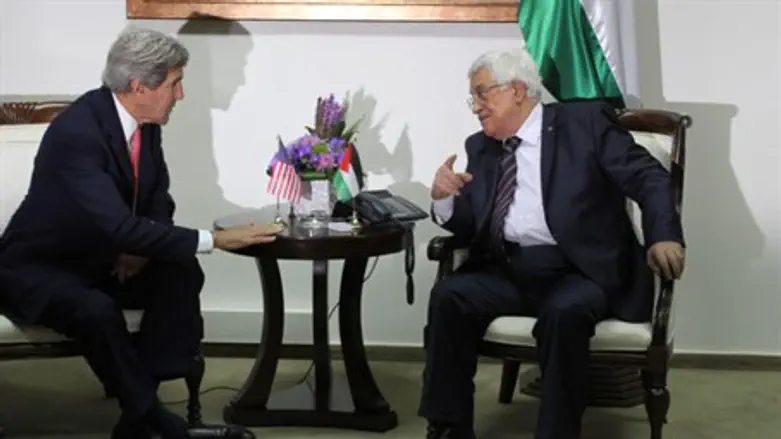
In response to reports that US Secretary of State John Kerry will delay the third batch of terrorist releases by a month, a spokesperson of Palestinian Authority (PA) Chairman Mahmoud Abbas declared Monday that the PA will not agree to the delay, reports Kol Yisrael government radio.
Issa Karaka, PA Minister of Prisoner Affairs, said that while an official confirmation of the postponement has yet to be made, there are definite American pressures in that direction. Karaka added that Abbas told Kerry in their meeting last week that he refuses the proposed postponement, saying the matter could negatively impact peace talks with Israel.
Kerry's delay is seen as meant to pressure the PA into accepting Kerry's proposed Jordan Valley security arrangements made last week, which PA officials say Abbas rejected as they would not have prevented Israelis from living in the area.
Meanwhile Yasser Abed Rabbo, a top Palestinian Liberation Organization (PLO) official, told AFP that Kerry's Jordan Valley proposals "will drive Kerry's efforts to an impasse and to total failure."
To date 52 of the 104 terrorists slated for release in "gestures" to keep peace talks going have gone free. The third batch of terrorist releases was set to occur in three weeks, although the new reports leave the timing unclear.
In late November a senior Palestinian Liberation Organization (PLO) official revealed that the PA is remaining in peace talks only to free all 104 terrorists.
On the flip side of Kerry's pressure on the PA, there are concerns that the US may pressure Israel to concede to Jordan Valley arrangements lessening or removing Israeli presence in the region.
On Sunday, Coalition head MK Yariv Levin (Likud-Beytenu) warned of these US pressures on Israel. Regarding Kerry's offers to Abbas, Levin noted his concerns came "because the question isn’t only security arrangements, but also our right to the Jordan Valley – a right we need to stand up for."
In response to the concerns, Major General Nitzan Alon, the Head of the IDF's Central Command, on Sunday argued "that the Jordan Valley is a strategic buffer for Israel," and added that the US supports this position.